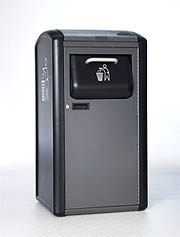
Garbage cans, even ones that appear stuffed to overflowing, contain a great deal of air. Heavy trucks grind through the streets burning fuel and puffing emissions in order to collect the garbage that is loosely piled in the cans and surrounded by air. In addition to fuel costs and polluting exhaust, salaries for a driver and the entire trash collection process struck Poss as profoundly inefficient. He saw a simple solution—get rid of the air so the cans could hold more trash and thus reduce the number of pickups.
The idea made so much sense that Poss launched a business while still completing his MBA. By using a compactor, he reduced the volume of trash in the can. A solar panel attached to the can charged a battery powered compactor. Applying 1,200 pounds of force to the trash in the can produced a 5-to-1 reduction in volume. The result is fewer trash pickups and a reduction in costs and emissions.
Angel investors were intrigued by the idea and pumped cash into the fledgling company until Poss had raised almost $10 million. The first BigBelly solarpowered trash compactor was manufactured in Vermont and sold to Vail Resorts in Colorado. At remote areas such as ski areas and state parks, the units can produce savings quickly by reducing the number of pickups. Some of the compactors are wireless enabled— essentially letting them twitter a text message when they are full. Large urban areas where frequent pickups are necessary have also found the BigBelly to be a good investment.
Of course the compactor is not cheap. It costs $3,000 to $3,900, or it can be leased for $80 a month; but Poss says the machine pays for itself quickly. Philadelphia leased 500 BigBellies for densely populated downtown areas where trucks were making 17 trash pickups a week. That number is now down to five and the city is saving $800,000 a year in labor and fuel costs. Over the product’s ten-year lifespan, savings can total $10 million or more, says Poss.
Massachusetts state parks, the city of Boston, and even trash removal giant Waste Management are buying the BigBelly. Although they are expensive replacements for the hardware store variety, on a large scale and over time, they can produce significant savings.
For more information visit www.bigbelly.com


